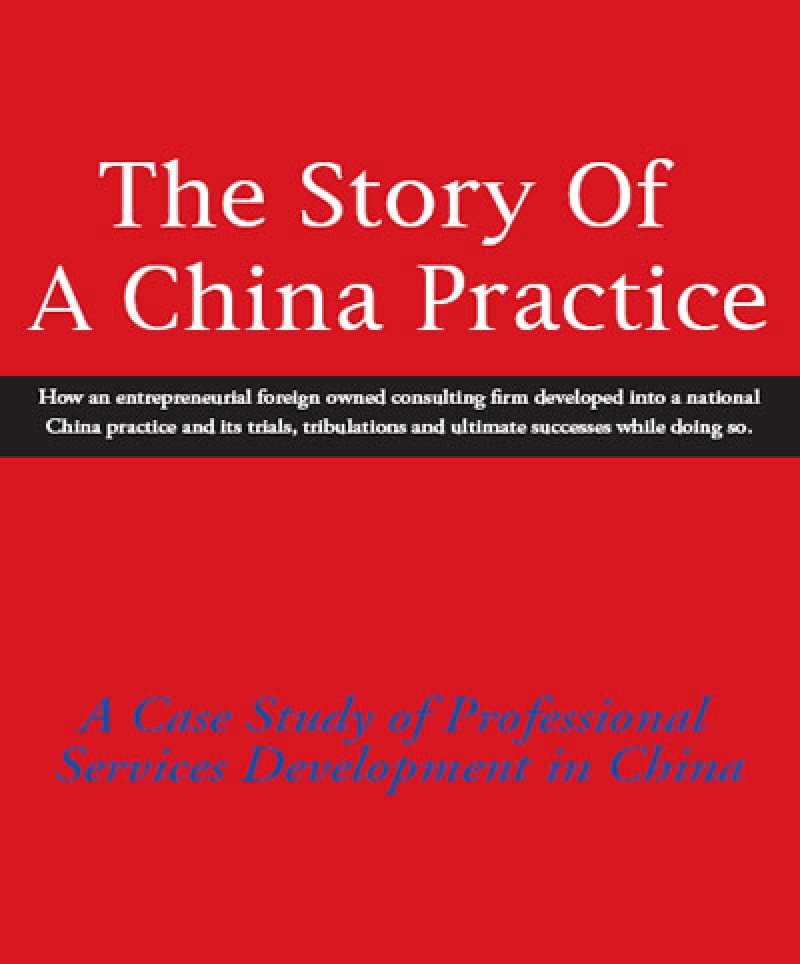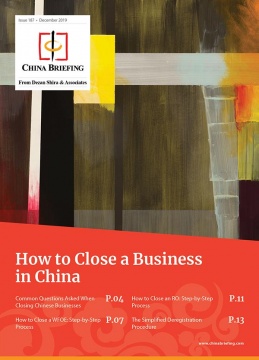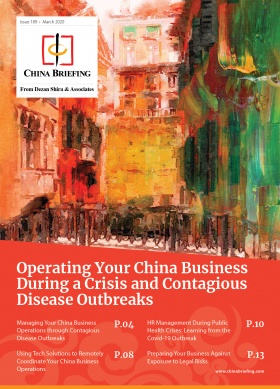COVID-19 – What to Do If Your China SME Becomes Insolvent
Op/Ed by Chris Devonshire-Ellis
Insolvency in a business occurs when there is not enough money to cover overheads. The extent of the problem varies depending on the precise cashflow situation; however, in times such as today’s COVID-19 outbreak, cashflow does get stretched in many businesses. Customers stop or cancel orders, while operating overheads remain fixed. It will be a problem for many businesses right now. But what is the best way to handle the situation?
It is something I have been through. The Asian Financial Crisis of 1997 wiped out nine months of client project work at a stroke – leaving me with purely ongoing and limited cashflow business to keep the company afloat. Overseas clients had expected China to devalue the RMB, so pulled out of all projects related to setting up a business in the country. What in two months previously had looked like a healthy business pipeline had just crumbled to dust. Yet I managed to pull out of it. How?
Brutal financial honesty
It is essential to get a real handle on your cashflow projections. This means stripping out all projected cash in projects or forecasts that are or could be in way compromised. Take out all income that is not 100 percent certain to come in. Look at the worst-case scenario. In times of trouble, this is typically what will actually happen. Sit down, take a deep breath at what you’ve just seen, and have a stiff drink. You deserve it for taking the first steps to crisis reality.
Reducing overheads
Advertising campaigns? Bin them. Unnecessary expenses? Cut them out. Office rent? Hassle your landlord relentlessly until they agree to a reduction or deferral. If they say “No” just ask them over and over again until they get fed up with you and do something. It is not in the landlord’s interests to be losing clients either, and empty spaces because they were not flexible is not a good advert for a property either. Examine all your commercial overheads and see what you can pare back to the bare minimum.
Staff overheads
Discuss the situation plainly and simply with your staff. If you have a good relationship with them, they may be willing to take a temporary cut, or two-week deferral to stretch your cashflow a bit. If they agree to do this, you remain within the boundaries of employment law. The importance of being seen to be a good boss who people like to work for is apparent here. You’re asking them for a favor – while at the same time they don’t want to be out of a job during a difficult time either.
You may also be able to renegotiate upcoming bonuses and salary increases. It is perfectly reasonable for employees to assist the business at such times. However, it is far better to do so on a collective, “we’re all in this together” type of meeting (wearing face masks!) than it is by email. Staff need that human touch, especially when you are discussing emotional issues, such as salary cuts and no bonuses.
The boss’ salary
Defer your own salary and take out only what you need for living expenses. Lead from the front. You can always catch up with arrears to yourself a bit later when things get better.
Creditors
Make a list of creditors and break them up into “essential” and “non-essential”. This can be determined in a number of ways:
- If they stop service will my business activity cease?
- How likely are they to be damaged if I reduce or stop payments? Larger MNC’s have bigger pockets. If you can, put them last, and look after your smaller suppliers first.
Then go and see them, if it is healthy to do so. A personal call visiting their offices is much more preferable to emails. It is also symbolically important to be seen taking the financial battle to your creditors offices rather than them coming to yours. They are also much more likely to be less assertive on their own territory if you visit them. They don’t want you making a scene on their premises.
It is important to recognize that other businesses also need to plan their cashflow. It is better they know exactly where they stand with you – even if it is bad news – than keeping them hanging around and not knowing how things stand. That’s what pisses people off. Be honest with them and try and renegotiate an achievable repayment schedule for debts. Anything is better than nothing. In my experience, most will agree to defer payment and will appreciate and recognize the fact that you took the responsibility upfront and discussed the situation frankly. Is it pleasant? No. Will it yield results and reduce cashflow pressure? Yes.
Discipline
Your staff will be looking to you as a leader. Show them examples of that. Get into work early, show them how committed you are to making the business work during tough times. It will rub off on your colleagues. Keep their spirits up. Remember their birthdays, make a fuss. That also means engaging with them, holding weekly update meetings, and being really on top of everything that is going on in your business. It takes discipline and courage. But that is why you set up as an entrepreneur anyway. Show that discipline and leadership and believe in your own capabilities.
Adjust your business model
After the Asian Financial Crisis, I changed the operational model of what Dezan Shira & Associates would do and the types of clients we wanted to attract. Although project driven work is valuable and can be lucrative, by definition, it has a beginning and an end. That means a business is always chasing its own tail trying to find new business income. I saw that as a potential weakness, so instead hired an accountant from Ernst & Young, and began offering on-going monthly tax filing and related accounting work to clients. Today that business model, where we have a significant client base who must pay us because that is the law, puts us in a far stronger position than it did pre-1997. Look at how your business needs to adjust to survive.
That business in 1997 that I had to fight for is now a multinational firm with offices in 13 countries and a head count running into several hundred. We now service thousands of international clients. It was worth saving. Doing the same for your business, getting back to basics, being disciplined, and above all communicating honestly with your staff and creditors is the way to go. Good luck – and don’t give up!
Related Reading
-
 The Story of a China Practice
The Story of a China Practice
A China cult business classic, detailing the issues arising from developing a small business practice in 1992 and the challenges, opportunities, and events that occurred during that time. It has received 20,000 downloads since publication and is currently available as a complimentary download. How to Close a Business in China
How to Close a Business in China
Companies in China may want to end their operations for various reasons. Irrespective of the reasons, investors cannot simply walk away without following proper closure procedures. Doing so will attract stringent penalties from the government’s tax and regulatory bodies and inflict lasting damage to the reputation of the company. In this issue of the China Briefing magazine, we walk foreign investors through the process of closing down their company in China.
About Us
Chris Devonshire-Ellis is the Chairman and Founding Partner of Dezan Shira & Associates. The practice services foreign investors into Asia and has done since 1992. Entrepreneurs needing confidential, practical advisory during this time may contact Chris at info@dezshira.com – he is prepared to discuss your situation and see what can be done to assist free of charge. In the meantime, please visit us at www.dezshira.com.
- Previous Article Alternatives to China: Where is the Manufacturing Capacity?
- Next Article New Export Tax Rebates, Customs Duty Exemptions for China-Based Trading Companies





















